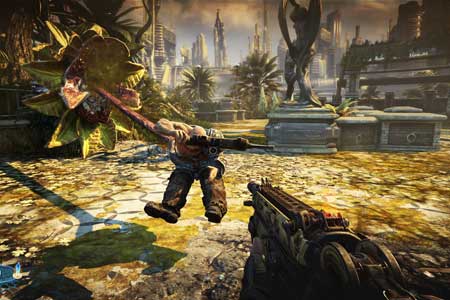Marvel Comics writer Rick Remender is best known for bringing the worlds of “Fear Agent” and “Uncanny X-Force” to life on the page. But he’s one of many comic-book creators who have taken the virtual plunge. After helping Electronic Arts bring the original survival horror franchise Dead Space to life, he partnered with Epic Games to create the pulp comic-book style shooter Bulletstorm (see “Character Traits” in the upcoming August/September issue of CGW). Remender talks about the creative overlap between the two worlds in this exclusive interview.
Marvel Comics writer Rick Remender is best known for bringing the worlds of “Fear Agent” and “Uncanny X-Force” to life on the page. But he’s one of many comic-book creators who have taken the virtual plunge. After helping Electronic Arts bring the original survival horror franchise Dead Space to life, he partnered with Epic Games to create the pulp comic-book style shooter
Bulletstorm (see “Character Traits” in the upcoming August/September issue of
CGW). Remender talks about the creative overlap between the two worlds in this exclusive interview.
How have you seen the convergence between games and comics expand over the years?
I think that the stories in video games have grown stronger. As the technology has progressed, we’re now able to do more integration within the gameplay through first-person animation without taking the controller away from the player. We’re doing that a lot in Bulletstorm, and we saw Call of Duty utilize that to great effect. I think that as that technology progresses and as we’re seeing more capability in the hands of the developers, story has become much more important.

What impact has that had on the stories being told today?
Developers now fall in love with their game stories, as have the players, and that has bled over into comic books as a perfect sort of place. One of the games I worked on, Dead Space, had a six-issue series that Image put out as a prequel to what happens in the game. A lot of other times you’ll see companies wait until their game is out, and then they’ll do a
Halo comic, for instance, where they’ll build their universe in the comic books, as well, and the fans buy the hell out of them. They sell really well for a reason: because of the amount of immersion and the amount of time invested in building universes and stories and interesting characters. Story is a much higher priority. It’s not just about gameplay anymore. It’s basically becoming what we all wanted as kids, where it’s a very exciting film, but you also get to play it. It seems like that’s the cross-pollination in taking things to comic books from video games: You get to develop your universe a little bit more and tell these stories.
When it comes to creating Bulletstorm, did you map it out as a comic book as well as a game?
No. I was in the midst of working on my screenplay for Last Days of American Crime, a book I wrote that Sam Worthington is going to be starring in, and Epic hired me to write the screenplay for that around the same time. I got cracking on
Bulletstorm, and having written a few screenplays, when I went into the writer’s room for the
Bulletstorm meeting, we decided to create this game experience much like a three-act movie.
Will there be a Bulletstorm comic?
Yeah. They’re definitely doing a comic book. I’m not sure how much I’ll be involved. I’m a Marvel-exclusive comic guy right now, so I don’t really have time. While the comic book won’t be something that I will be writing directly, I’ll have a hand in it for sure.
How did your comic-book roots influence the tongue-and-cheek, pulp aspect of Bulletstorm’s action?
The tongue and cheekiness is just my personality. There’s a subversive humor element to the game. I like to try and write B-movie style dialog that, in one hand, will be smutty and in the gutter, sort of akin to a classic pulp, and then later on shine a light on the character’s intellect as well, so that there’s something that is a little more three dimensional.

What’s your own background in gaming, and how did that help when working on Bulletstorm and Dead Space?
Other than my work on Dead Space, I spent a little under a year working in-house at Electronic Arts as a storyboard artist while I was writing some of my books for Image and Dark Horse. I’ve always been a big video game player. In fact, for most of my comic-book freelance friends and myself, that’s our only source of social time because you’re in your house working by yourself. You hop on the Xbox first and play
Call of Duty’s *“Nazi Zombies” and chitchat while we murder things. I’m a big gamer. I come from animation. I worked on *Titan AE,
Anastasia,
The Iron Giant, and a few other things in the past. I’ve hopped around all different sides of this industry, and between video games and comics and films, I have a pretty clean grasp of things. It wasn’t difficult hopping into the lead writer’s chair for
Bulletstorm.